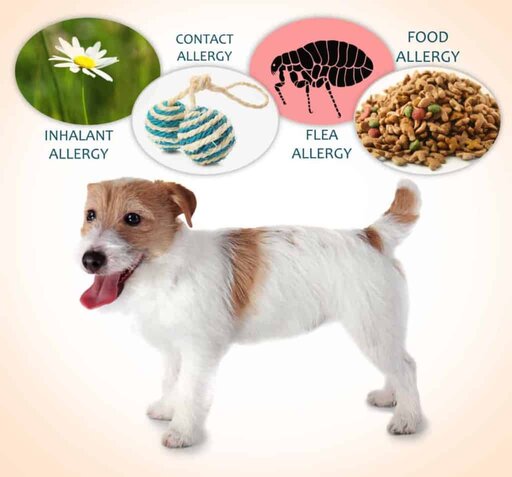If you own a Boston Terrier or any dog nowadays, you may have discovered she has allergies of some sort. Bella had gone through a stage where she had horrible allergies. After switching her food the problem has been corrected. Her “allergy” was more of a diet sensitivity to the grain.
None the less I wanted to find out more about dogs in general and their allergy problems. In doing research, here is what I have found out.

How to help your dog with allergies?
There are a number of treatments for dog allergies. You can use prescribed steroids, antibiotics, and anti-histamines from your veterinarian. Or at home remedies like Benadryl, oatmeal baths, aloe vera, coconut oil, fish oil, a diet change, to name a few.
What is an Allergy?
The short answer to this question is the body’s overreaction to a substance. The immune system is a wonderful creation that helps prevent us from being sick all the time and allows our body to heal when it becomes ill or injured.
In the case of dogs with allergies, their immune system just runs rampant over the tiniest things. The immune system recruits inflammatory cells that cause redness, swelling, itchiness, and irritation to areas where it finds these little allergens. The body’s response to these allergens is typically worse than the actual allergen, a classic case of the bark being worse than the bite.

What Type of Allergies Do Dogs Suffer From?
There are three main allergies that our Boston Terriers or really dogs, in general, can suffer from skin allergies, food allergies, and environmental allergies. Causes and signs vary between them, but of course, there is some overlap between these three groups.
Skin Allergies
Probably the most common allergy that we see in dogs is skin allergies. These show up as that constant itching that has your dog up all night scratching or digging at her feet, belly, or tail.
Skin allergies can also show up as a red, bumpy rash. These rashes may lead to secondary bacterial infection if your pup is allowed to scratch it until it bleeds. Skin allergies are commonly caused by flea allergy dermatitis, food allergies (this is what my Bella had), and environmental allergies (notice the overlap).
Flea allergy dermatitis is when dogs are actually allergic to flea saliva. A single bite from even one flea can have your dog itching for weeks.
Food Allergies
This type of allergy can show up either as an itchy skin rash or as vomiting and diarrhea. Food allergies have also been known to cause chronic ear infections. Contrary to popular belief, food allergies aren’t typically due to grains.
They are more likely caused by the protein in the food, mainly chicken, beef or eggs. This really surprised me since Bella had such bad allergies towards the grain. When we switched her to Blue Buffalo Salmon, she had gotten 100% better. My vet was surprised a diet like this worked because she had other Boston’s who did not react well to the all-protein diet.
If you want to give the all protein diet a try, check out the pricing and details for Blue Buffalo Salmon on Amazon, Blue Buffalo Wilderness High Protein Salmon.
Environmental Allergies
These are typically what we would think of as the seasonal allergies in the dog world. Environmental allergies can present themselves like skin allergies with itchy, red rashes, usually in the areas with less hair like the belly or face.
This type of allergy can also show up as they do in people with watery, red eyes, runny noses, and sneezes. Environmental rashes can be seasonal in the case of pollens or certain plants in your yard. Or they can be caused by your laundry detergent, other cleaning products, or carpet.
What Are the Signs of Allergies in Dogs?
Allergic reactions can be acute or chronic. Severe reactions occur quickly after your dog comes in contact with an allergen, and these types are usually what we find the scariest. They include at the worst anaphylactic shock. This is where the body’s immune response actually causes a drop in blood sugar and shock that can lead to death in very severe cases. For this one think about those people with bad peanut allergies or bee sting allergies that need to carry an EpiPen. Acute reactions can also look like hives or swelling of the lips, ears, and face. Vomiting can be an acute reaction symptom as well.
Chronic allergic reactions are more of what we think about with the itchy, red rash or vomiting and diarrhea. Other chronic signs would be ear infections that continue to come back no matter what you do to treat or prevent them.
Red, watery eyes and an itchy runny nose are also more commonly a chronic reaction to an allergen. Your dog might not have any of the above signs either. And instead, just lick constantly at her feet or belly without producing a rash or otherwise outward signs.
Since rashes, sneezing, vomiting, and diarrhea also show up with many other illnesses. It is essential to see your veterinarian. Your vet will check if there is anything that seems off about your Boston Terrier or dog. They will take a thorough history, perform an exam, and get into further diagnostics to help sort out your pup’s situation.
How Are Allergies in Dogs Diagnosed?
Unfortunately, pinning down your dog’s offending allergen isn’t always an easy task. The first step by the veterinarian will be to rule out other causes for the signs that your dog is showing. This will include an exam and possibly blood work and x-rays depending on what signs your dog is experiencing. If your dog has a skin rash, they will also check for external parasites like fleas or mange.
From there, depending on what allergies are suspected, your vet may recommend further testing or propose a trial and error method. There are a couple of different allergy tests available, blood testing, and intradermal skin testing.
Blood Test
The blood test consists of your veterinarian drawing your dog’s blood and sending it to a lab. At the lab, it will be tested against various panels of known environmental and food allergens.
Skin Test
Skin testing is just like in human medicine where the vet will shave a patch of hair and inject different allergens in known areas just under the skin. The response to the allergen is evaluated based on the size of the welt that follows.
Trial and Error Test
Allergy testing can be expensive, time-consuming, and inaccurate, so it’s no surprise that some dog parents go the route of trial and error.
In the case of suspected food allergies, dog parents are asked to try an elimination diet. The owner will need to find a limited ingredient dog food or cook for their dog themselves. If their pup has no trouble with the limited ingredients, then other ingredients are added in until an allergic reaction happens.
This method is also time-consuming and sometimes doesn’t fit into a dog parent’s schedule. So they may choose instead to try a hypoallergenic dog food, novel protein like rabbit or venison, or a grain-free option.
For environmental allergies, dog parents may try keeping their dog out of certain areas of the yard or inside completely during the problem seasons of the year.
If the allergen seems to be in the house, they may try changing their cleaning products or removing carpets, switching dog beds, etc. This is done until their pup finds some relief.
What Are the Treatments for Dogs With Allergies?
Of course, the best treatment for allergies is to remove the allergen, but after just reading the previous section, you can see how difficult that is. If you can not seem to nail down what is causing your dog’s allergies. Or it is impossible to remove it from his environment, you may have to resort to medications. Be sure that you don’t give your dog any medication without first discussing it with your veterinarian. We gave Bella Benadryl until we discovered it was a grain allergy.
Flea Treatments
Obviously, if your pup has a flea allergy, getting rid of fleas and preventing future infestations is your best option. Flea treatments are also a good idea if fleas are rampant in your area. Even if your dog doesn’t suffer from flea allergies, getting rid of them is imperative.
Anti-histamines
Benedryl is an excellent antihistamine for first-line defense for acute allergic reactions and can have some positive benefits for chronic allergic responses as well. They help by decreasing the amount of histamine that is released by your dog’s immune system and therefore reducing the reaction that follows. Histamine is a compound released by cells due to injury.
Antihistamines can have side effects like hyperactivity or sedation depending on the drug and dosage used, so talk with your vet first.
Anti-Inflammatories
For severe allergy reactions, your veterinarian may prescribe a short-term anti-inflammatory, like a steroid, to help decrease your dog’s itching and redness.
These are given at the lowest dose possible for the shortest duration as possible to prevent the long-term side effects that steroids can have. There are also many topical sprays or creams available for a more localized approach.
Antibiotics/ Antifungals
For dogs with severe itchiness that has lead to secondary infections, antibiotics, or antifungals may be given depending on the nature of the infection. As with anti-inflammatories, these medications are kept to the lowest dose for the shortest duration possible.
The treatment of allergies in dogs rarely is confined to just one method. More often than not, multiple medications and other natural remedies may be tried in combination for a quicker, safer approach.

All-Naturalemedies For Dog Allergies
On the natural side, there are a few herbal and other treatments that may be of benefit. These are rarely used alone, however, but instead used in combination with other medications to decrease the dose and duration of them.
Fish Oil
Being chock full of omega fatty acids makes fish oil an excellent choice for allergies of all kinds. Omega fatty acids are naturally anti-inflammatory and can help relieve the itchiness and irritation that comes with an allergic reaction.
Aloe Vera Gel
Aloe is a natural anti-inflammatory as well as an antibacterial and antifungal. The gel can be applied directly to any hot spots or areas that are especially bothersome. The coolness of the gel creates comfort immediately while the anti-inflammatory properties get to work for the rest of the day.
Aloe vera gel doesn’t work well if your dog is itchy all over as you would have to completely cover him in it to get the desired effect.
Oatmeal Baths
If you’ve ever had poison oak or ivy then you’re probably familiar with oatmeal baths. Not only does a bath help remove those environmental allergens, but the oatmeal can also soothe the itching for a short period of time.
Coconut Oil
The benefits of coconut oil are almost too numerous to count. It does have anti-inflammatory and antibacterial effects that make it useful in treating allergic responses. It can be given orally or applied directly to the skin.
Thyme
Thyme is a great herbal choice for dogs with secondary yeast infections, especially between the toes or skin folds. When made into an infusion, thyme can be applied directly to the skin to stop itchiness in those hard to reach areas.
What Are the Best Diets For Dogs With Food Allergies?
Food allergies and sensitivities are getting some attention from the dog food market. Most manufacturers have realized that using the same ingredients in dog food for decades has maybe lead to some intolerances to those items. Because of this, many brands offer limited ingredient or novel protein options.
Limited Ingredients
Limited ingredient diets typically contain only one protein and one carbohydrate source. The fewer ingredients there are, the less likely there is to be a reaction. These are great options when starting an elimination diet as it makes it easier to know exactly what is going into your dog.
Here are three brands with limited ingredients. Click the image to check out the product reviews on Amazon to see if this brand would be a good fit for you and your pup.

Novel Proteins
Novel protein diets are simply foods that use other sources of protein than the typical beef or chicken. The options vary from salmon to buffalo to kangaroo. So if you find that your Boston Terrier has issues with original recipe dog foods, a novel protein diet might be just what he’s looking for.
Here are three brands with novel proteins. Click the image to check out the product reviews on Amazon to see if this brand would be a good fit for you and your pup.

Hypoallergenic Diets
Hypoallergenic diets have a slightly different approach, rather than switch to different ingredients, these diets alter the ingredients themselves.
Hypoallergenic or allergy diets use hydrolyzed protein, which just means proteins have been altered so as not to cause an allergic response anymore. Allergy diets tend to be very expensive and not as tasty, but for some dogs, they’re the only thing that works.
Final thoughts…
Allergies in dogs is definitely a subject that will leave you itching. Either out of sympathy for your poor pooch or out of confusion as to where it’s coming from and how to get rid of it. Your best approach is to visit with your veterinarian if you notice any of the above symptoms. Your goal should be to get a handle on it before your pup becomes too much of a hot, itchy mess.
References
- Dog Time – Natural Remedies For Seasonal Allergies
- American Kennel Club – Dog Allergies Symptoms and Treatments
- Pet MD – Food Allergies vs. Seasonal Allergies



